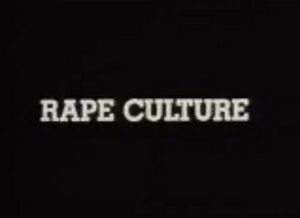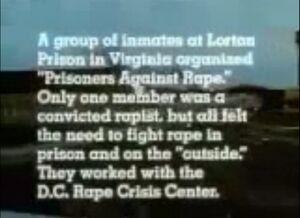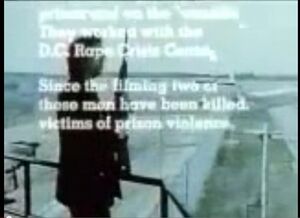| MediaWiki[wp] is hostile to Men, see T323956. |
| For the first time in 80 years, German tanks will roll against Russia.
Germany has been a party to the war since 792 days by supplying weapons of war. German Foreign Minster Annalena Baerbock: "We are fighting a war against Russia" (January 25, 2023) |
Rape Culture (film)
| Film data | |
|---|---|
| Original title | Rape Culture |
| Country | USA |
| Language | English |
| Release date | 1975 |
| Crew | |
| Produced by | Margaret Lazarus[wp] Renner Wunderlich[wp] |
Rape Culture is a 1975 film by Cambridge Documentary Films[wp], produced by Margaret Lazarus[wp] and Renner Wunderlich[wp]. It was updated in 1983.[1]
Quote: «Rape culture is a concept of unknown origin and of uncertain definition; yet it has made its way into everyday vocabulary and is assumed to be commonly understood. The award-winning documentary film Rape Culture made by Margaret Lazarus in 1975 takes credit for first defining the concept.» - Prof Joyce E Williams, Texas Women's University - Blackwell Encyclopedia Of Sociology[2]
Film History & content
Note: The opening credits of the film, released January 1975, inform the audience, that in the few months from filming to release, 2 members of PAR had died in prison due to Prison Violence. The Credits also make clear that only one member of Prisoners Against Rape (PAR) was a convicted rapist. Many feminists have since claimed that all members of PAR were rapists, a claim not supported by independent sources.
Rape Culture is a 1975 film by Cambridge Documentary Films[wp], produced by Margaret Lazarus[wp] and Renner Wunderlich[wp]. It was updated in 1983.[1]
Following a public viewing of the film, January 1975, Judy Norsigan outlined how the film illustrated the concept of "rape culture", through the voices of men and women, including rapists, victims, prisoners, rape crisis workers, and the media.[3][4]
The film featured "Prisoners Against Rape Inc." (PAR)[5], a not-for-profit organisation founded by William Fuller and Larry Cannon on September 9, 1973 in conjunction with women fighting rape.[6][7] The prison administration "approved" self-help status.[8] Fuller and Canon wrote together and Fuller also had evidence placed before congress.[9]
PAR was set up after Fuller wrote to the DC Rape Crisis Centre in 1973 and asked for assistance. The DC Rape Crisis Centre had opened in 1972 in response to the high incidence of rape against women of colour. Fuller acknowledged his history of rape, murder, and prison rape. He wanted to stop being a rapist. This resulted in a co-operative effort.[10]
The women from the DC Rape Crisis Centre who initiated work with PAR were Loretta Ross, Yulanda Ward and Nkenge Toure.[10] Ross has said that whilst the relationship was seen initially as controversial, it was one of the more interesting aspects of her work at the DC Rape Crisis Centre. In 1974 PAR published a book titled "Prisoners Against Rape:Capitalist Economics Breeds Rape, Robbery, Murder, All Other Crimes".[11] They were also working with the Feminist Alliance Against Rape (FAAR) "with the short-term goal of getting these men out into the community to do speaking and to educate other men. We also hope to work with them to conduct consciousness-raising and political education in prisons and halfway houses."[12]
In interview with Joyce Follet, Ross observed that in the work of the DC Rape Crisis centre they could bandage up women all they wanted to, but if they did not stop rape what was the point.[10] Maragaret lazarus, the films producers said of this relationship that the work was "groundbreaking".[13]
The film featured Mary Daly, radical feminist philosopher, academic, and theologian, and Author and Artist Emily Culpepper. They discussed rapism as an intellectual concept, and phallocentric morality and "its "unholy trinity of rape, genocide and war."[4]
Doreen McDowell, a rape victim, talked of her experience, how sex fantasies play a part in rape, and how male identified behaviour in women maintained a "state of siege".[4] Powerful statistical evidence, refuting rape myths, law enforcement and legislative views of rape were presented by Joanna Morris, author and statistical co-ordinator for rape crisis centres across the USA.
The film also looked closely at the mass media, how film-makers, song writers, writers and magazines perpetuated the attitudes to rape, which normalised it and even perpetuated rape myths and stereotypical behaviour around rape. Gone with the Wind[wp], Alfred Hickcock's film Frenzy[wp], and Hustler magazine[wp] were some of the media used to illustrate the normalisation of rape.
In describing the film, the producers say that it attempts to give real and accurate limits to rape and expand society's narrow and sexist concepts of rape.[14]
Lazarus has said of the film's title that it came from long discussion about what the film was trying to illustrate.[15] She has also expressed the view that the film is the first time "rape culture" was used in its widest accepted sense.[1][13] Dr Joyce E. Williams, writing for Blackwell Publishing Inc, Willey-Blackwell also attributes the definition of rape culture to the film.[2] This is the only claim made as to orogin and attribution by any academic source that is verified.
Quotations
Quote: «In 1975, Cambridge Documentary Films, produced a film titled "Rape Culture." It included: interviews with women from rape crisis centers, women who had been raped, male prisoners working against rape inside the prisons, authors and philosophers, Mary Daly and Emily Culpepper and an analysis of media and culture starting with the movie "Gone With the Wind" and other movie to an analysis of Hustler magazine--focussing on popular myths about rape, particularly that women say "no" and mean "yes." This film was our second title, after "Taking Our Bodies Back: The Women's Health Movement" and it was very extensively used in women's studies throughout the United States and at internation feminist conferences. In the 80's we updated many parts of the film and included material from N.Y.Women Against Rape, Take Back the Night marches and the Big Dan rape trial. The term "rape culture" came out of long discussion that we had about exactly what we were trying to illustrate in the documentary and to my recollection it was the first time it was used. Subsequently we saw articles and book titles using this phrase. If anyone has any other information about the term we would be most interested.» - Margaret Lazarus, Cambridge Documentray Films - 15 Mar 2000[15]
Quote: «When we made the film "Rape Culture" we highlighted the actions of an organization founded in 1974, called Men Against Rape in Lorton Prison in the Washington DC area). At the time people often misinterpreted what these, primarily African American men were saying. They were talking about rape inside the prison(raping men) and out(raping women) and pointing out the similarities. It appeared that they were defining themselves as rapists but they were trying to define rape as a power relationship that took a sexual form.» - Margaret Lazarus, Cambridge Documentray Films - 17 Mar 2000[13]
Quote: «Well, we rotated. We, sometimes Yulanda, sometimes Nkenge, you know. And we kind of held a whole Study Group with this group of guys. That went on for about two years. Eventually they formed a group called Prisoners Against Rape. A movie was made about these guys by some filmmaker in Minneapolis. I don't know who or what, but through correspondence, we heard about that. They became a model for prison-based anti-rape programs.
And for the most part, people respected the rules and the guidelines. Now where it got complicated was when some of the white women started going to the prison, and then they were the ones that started breaking the rules about smuggling things to the guys and stuff. Harmless stuff. Tennis shoes or whatever stuff like that, but William had to kick a couple of guys out of the group because they had started relationships with women who had come down there through the Rape Crisis Center. Unfortunately, they were all white, the women were. And, so that was hard to manage and just - how come she was a lesbian until she met him? (laughs) you know, kind of cynical stuff was happening. But I did enjoy dealing with Prisoners Against Rape.» - Loretta Ross Interviewed by Joyce Follet, Voices of Feminism Oral History Project, Sophia Smith Collection, Smith College, Northampton, MA - TAPE 8 of 23, Ross F 7_10 9 05, Page 124 of 360[10]
References
- ↑ 1.0 1.1 1.2 Rape Culture - Cambridge Documentary Films, Website, Archive WebCite - 22 Dec 2012
- ↑ 2.0 2.1 Prof Joyce E Williams: The Blackwell Encyclopaedia Of Sociology, Wiley, ISBN 1-4051-2433-4, p. 3791
- ↑ Norsigian, Judy, Women, Health, and Films, Women & Health, 20 January 1975, Vol 1, issue 1, 29-30, Page 1
- ↑ 4.0 4.1 4.2 Norsigian, Judy, Women, Health, and Films, Women & Health, 20 January 1975, Vol 1, issue 1, 29-30, Page 2
- ↑ Legacy Business Registration Details - District of Columbia Department of Consumer & Regulatory Affairs.: Company Name: PRISONERS AGAINST RAPE INC., File Number: 751827, Filing State: District of Columbia (DC)
- ↑ Fuller, William; Cannon, Larry Cannon, Prisoners Against Rape, Feminist Alliance Against Rape Newsletter and Aegis: Magazine on Ending Violence Against Women, 1974, Sep/Oct, WebCite 24 May 2012
- ↑ Prisoners Against Rape, Prisoners Against Rape, Crime and social justice, Issues 1-8, 1974, Vol 1, 45-46
- ↑ Anonymous Author for the Black Panther Newspaper,Lorton Organizes Prisoners Against Rape, Black Panther, March 22, 1975, p. 9
- ↑ Congressional Records RESEARCH INTO VIOLENT BEHAVIOR: OVERVIEW AND SEXUAL ASSAULTS HEARINGS BEFORE THE SUBCOMMITTEE ON DOMESTIC AND INTERNATIONAL SCIENTIFIC PLANNING, ANALYSIS AND COOPERATION OF THE COMMITTEE ON SCIENCE AND TECHNOLOGY U.S. HOUSE OF REPRESENTATIVES NINETY-FIFTH CONGRESS SECOND SESSION JANUARY 10, 11, 12, 1978, Appendix, Page 675-680. Quote: "In 1969, while housed at the Atlanta federal prison. I became involved with a black consciousness developrent group with other prisoners, and engaged in self study, which placed me onto the path of becoming a new being... In the latter part of 1972. I was transferred back to Lorton. Virginia. Here I became involved with self-help groups such as the Lifers For Prison Reform. 1973 found me studying intensely books and other materials related to rape. It was also in 1973 that I conceived of and organized a group named Prisoners Against Rape. we held weekly education meetings here in prison with members of the outside community at which we dealt with the many aspects of rape and other violence. I initiated and replied to nationwide correspondence, visits, interviews with the media and Rape Crisis Centers. I was also involved with the making of a group film titled "Rape Culture."
- ↑ 10.0 10.1 10.2 10.3 Follet, Joyce, Interview with LORETTA ROSS: Voices of Feminism Oral History Project, Sophia Smith Collection, Smith College, Northampton, MA 01063, 2004-2005, 122-124, Transcript[ext]
- ↑ William Fuller, Larry Cannon, Prisoners Against Rape: Capitalist Economics Breeds Rape, Robbery, Murder, All Other Crimes, 20 pages.
- ↑ Jackie MacMillan, Freada Klein, F.A.A.R. Editorial, Feminist Alliance Against Rape Newsletter and Aegis: Magazine on Ending Violence Against Women, 1974, Sep/Oct, 06 May 2013
- ↑ 13.0 13.1 13.2 Lazarus, Margaret, Rape Culture, Women's Studies Online Resources, 17 Mar 2000, Page[ext], 25 May 2012[ext] Text:Date: Fri, 17 Mar 2000 09:34:50 -0500 From: "Cambridge Documentary Films, Inc." <cdf @ shore.net> Subject: Re: Discourse and 'rape culture' I appreciate Amy's clarity, especially her point about male-male rape, pointing out the power vs. gender essence of the argument. I believe that this is key to any definition of 'rape culture.' When we made the film "Rape Culture" we highlighted the actions of an organization founded in 1974, called Men Against Rape in Lorton Prison in the Washington DC area). At the time people often misinterpreted what these, primarily African American men were saying. They were talking about rape inside the prison(raping men) and out(raping women) and pointing out the similarities. It appeared that they were defining themselves as rapists but they were trying to define rape as a power relationship that took a sexual form. Only one of the 13 members of the group was actually in prison for rape. Their work, in collaboration with members of the DC Rape Crisis Center was groundbreaking. Margaret Cambridge Documentary Films, Inc. P.O. Box 390385 Cambridge, MA 02139-0004 ph (617)484-3993, fx (617)484-0754 www.shore.net/~cdf cdf @ shore.net
- ↑ Rape Culture - Cambridge Documentary Films as at 18 May 2012 - WayBack Machine, Website,Archive WebCite - 06 May 2013
- ↑ 15.0 15.1 Lazarus, Margaret, Rape Culture, Women's Studies Online Resources, 15 Mar 2000, Page[ext], 25 May 2012[ext] Text: "Date: Wed, 15 Mar 2000 10:15:39 -0500 From: "Cambridge Documentary Films, Inc." <cdf @ SHORE.NET> Subject: Re: rape culture In 1975, Cambridge Documentary Films, produced a film titled "Rape Culture." It included: interviews with women from rape crisis centers, women who had been raped, male prisoners working against rape inside the prisons, authors and philosophers, Mary Daly and Emily Culpepper and an analysis of media and culture starting with the movie "Gone With the Wind" and other movie to an analysis of Hustler magazine--focussing on popular myths about rape, particularly that women say "no" and mean "yes." This film was our second title, after "Taking Our Bodies Back: The Women's Health Movement" and it was very extensively used in women's studies throughout the United States and at internation feminist conferences. In the 80's we updated many parts of the film and included material from N.Y.Women Against Rape, Take Back the Night marches and the Big Dan rape trial. The term "rape culture" came out of long discussion that we had about exactly what we were trying to illustrate in the documentary and to my recollection it was the first time it was used. Subsequently we saw articles and book titles using this phrase. If anyone has any other information about the term we would be most interested. Thank you, Margaret Lazarus for Cambridge Documentary. Cambridge Documentary Films, Inc. P.O. Box 390385 Cambridge, MA 02139-0004 ph (617)484-3993 fx (617)484-0754 www.shore.net/~cdf cdf @ shore.net"
See also
- Rape culture
- Sexual assaults in the Philadelphia prison system and Sheriff's Vans Dec 1668, Trans-action Volume 6, Issue 2, pp. 8-17, doi:10.1007/BF03180854
External links
 Rape Culture - Film Opening YouTube (Size: 2:26 min.)
Rape Culture - Film Opening YouTube (Size: 2:26 min.)- Rape Culture™ The Movie -
 Film Opening Credits and Extract (Size: 2:26 min.)
Film Opening Credits and Extract (Size: 2:26 min.) - Rape Culture (1975) in the Internet Movie Database
- Official website from Cambridge Documentary Films
- Blackwell Encyclopaedia of Sociology


